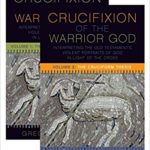We run our website the way we wished the whole internet worked: we provide high quality original content with no ads. We are funded solely by your direct support. Please consider supporting this project.

Does Paul Condone Vindictive Psalms? A Response to Paul Copan (#1)
In a recent paper delivered at the Evangelical Theological Society, Paul Copan raised a number of objections against my book, Crucifixion of the Warrior of God. This is the first of several blogs in which I will respond to this paper. (By the way, Paul and I had a friendly two-session debate on Justin Brierley’s podcast Unbelievable. They will air sometime next month.)
A major thrust of Copan’s critique of my book is his contention that NT authors were not as opposed to violence or to a violent conception of God as I claim. My first couple of posts in this series will address the passages he cites. One of the first examples Copan offers is Paul’s citation of Psalms 69:22-23 in Romans 11:9-10. Here Paul quotes “David” as saying,
Let their table become a snare and a trap,
a stumbling block and a retribution for them;
let their eyes be darkened so that they cannot see,
and keep their backs forever bent.
Copan correctly notes that in CWG I claimed that this vindictive prayer contradicts the life and teaching of Jesus (CWG, 328). To give the full quote, I wrote:
…in direct contradiction to Jesus, who healed the severed ear of an enemy and who spent his entire ministry demonstrating God’s desire for the blind and disabled to be healed, the psalmist petitions God to blind his enemies or to cripple them with scoliosis
The trouble with my view, according to Copan, is that Paul apparently had no problem with this Psalm. He thus concludes I am mistaken in thinking that there is anything about this Psalm that contradicts the life and teachings of Jesus.
To set the stage for my response, I think it’s important to grasp the broader context of the passage that Paul quotes, especially since my statement in CWG was part of a broader critique of this and other imprecatory Psalms. This author not only prays that his personal enemies would be entrapped at their own table, go blind, and be smitten with scoliosis (vv22-23), he also prays that God would pour his “burning anger over them” (v.24). He then prays that the camps of his enemies would become “desolate” so that “no one” would “live in their tents” (v.25). And, most vindictively, he prays that his enemies would receive “no acquittal from you” (v.27) and would be “blotted out of the book of the living” so that none of them would be “enrolled among the righteous” (v.28).
I feel I’m on safe ground when I claim that these prayers contradict the example Jesus left for us to follow when he chose to die out of love for his enemies rather than to use his power to crush them, and when he prayed for the forgiveness of these enemies as he was dying (e.g. Eph 5:1-2; I Pet 2:21; I Jn 3:16). They contradict as well Jesus’ instruction for us to love, bless, and do good to our enemies (Mt 5:39-45; Lk 6:26-35). As such, I see the primary God-inspired revelatory content of vindictive biblical prayers such as these to reside in the manner in which they bear witness to God’s merciful accommodating nature. They reveal that God has always been doing what he does on the cross (Heb 13:8), stooping as far as necessary to meet his people where they are at, and to bear their sin.
But what then do I do with Paul’s quotation of this Psalm? Are we to believe that Paul — who taught us that love is never resentful and hopes for the best for all (I Cor 13:5, 7)– condoned this Psalmist’s prayer for his personal enemies to never be forgiven so their names would be blotted out of the book of life? In my view, the sheer fact that Paul quotes from this Psalm implies nothing of the sort. For as is frequently true of the way Paul and other NT authors cite the OT, the way Paul applies Psalm 69:22-23 dramatically alters its original vindictive meaning.
First, we must notice that, while the original Psalmist was praying against personal enemies whom he hoped would be damned, Paul applies this passage to describe the spiritually stumbling state of Israel as a nation, whom he hopes will be saved (10:1; 11:23). In fact, Paul went so far as to confess that he would be willing to forfeit his own salvation if it would result in the salvation of his Jewish comrades (Rom 9:3). So, while the original passage prescribes vengeance on enemies the author hopes will be damned, Paul uses it in a way that simply describes the tragic spiritual condition of people he loves and hopes will be saved.
Second, while the Psalmist prayed for his enemies to suffer literal physical afflictions, including literal blindness, Paul uses this passage to describe Israel’s spiritual afflictions. And in the context of Romans 9-11, it’s clear that the Israelite “table” that became “a snare and a trap” for them was their assumption that the righteousness of God could be attained by striving for it rather than by relying on faith (e.g. Rom 9:30-32). Hence, while Paul quotes the “letter” of Psalm 60:22-23, he does so with a very different “spirit” (2 Cor 3:6).
I completely agree with Copan that Paul regarded Psalms 69, and the entire OT, to be divinely inspired. Where we seem to disagree is on whether or not this implies that Paul affirmed everything about Psalm 69 and about the OT as a whole. At the very least, Paul’s citation of Psalm 69:22-23 offers no proof that Paul affirmed the expressions of vindictive violence in this prayer, and it thus offers no proof that I was mistaken in claiming these expressions of vindictive violence contradict the life and teachings of Jesus.
Photo by williamnyk on Visual Hunt / CC BY-NC (modified)
Category: General
Tags: Crucifixion of the Warrior God, Cruciform Theology, Paul Copan
Topics: Interpreting Violent Pictures and Troubling Behaviors
Related Reading

Crucifixion of the Warrior God Update
Well, I’m happy to announce that Crucifixion of the Warrior God is now available for pre-order on Amazon! Like many of you, I found that the clearer I got about the non-violent, self-sacrificial, enemy-embracing love of God revealed in Christ, the more disturbed I became over those portraits of God in the Old Testament that…

Did the Father Suffer on the Cross?
When I argue that the cross is a Trinitarian event (See post), some may suspect that I am espousing Patripassionism, which was a second and third century teaching that held that God the Father suffered on the cross. While this view was often expressed as a form of heretical Modalism, and while the Patristic fathers…

Atonement: What is the Christus Victor View?
Most western Christians today understand the atonement as a sort of legal-transaction that took place between the Father and the Son that got humanity “off the hook.” The legal-transaction scenario goes something like this: God’s holiness demands that all sin be punished, which in turn requires that sinners go to eternal hell. The trouble is,…

Reviewing the Reviews: Tom Belt (Part 1)
Tom Belt has written a four-part review of Crucifixion of the Warrior God on his blog An Open Orthodoxy. Parts 1 and 2 offer an overall fair and balanced summary of CWG, at least to the point that correcting misunderstandings would feel petty. In Part 3 Tom offers a critique of volume I, and this is what I’d like…

Podcast: How Do You Teach a Cruciform Hermeneutic from the Pulpit?
Greg talks about infallibility and inerrancy. http://traffic.libsyn.com/askgregboyd/Episode_0281.mp3

Podcast: Overflow Episode 1 — Dust, Flashlights, and Heathens
Dan and Brianna tackle some tough questions: —Is it okay for Christians to be cremated? —How can we preach from the OT with authority? —What should a Christian academic know in a secular school? http://traffic.libsyn.com/askgregboyd/Episode_0320_overflow_1.mp3
